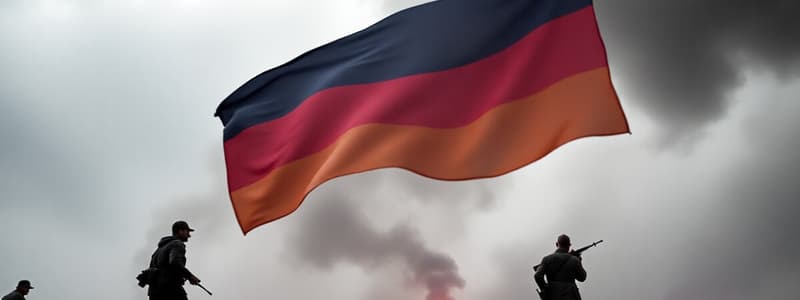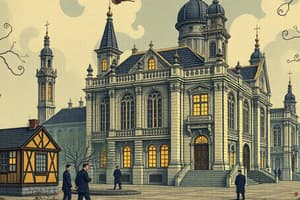Podcast
Questions and Answers
What was one reason the USSR opposed the creation of a West German state?
What was one reason the USSR opposed the creation of a West German state?
- They wanted control over the entire German territory. (correct)
- The industrialized areas were primarily in the eastern zone.
- The West had already established a communist government.
- They were concerned about a potential revival of German militarism. (correct)
How did the Western powers respond to the Soviet blockade of Berlin?
How did the Western powers respond to the Soviet blockade of Berlin?
- They initiated an airlift to supply West Berlin. (correct)
- They launched a ground invasion into East Berlin.
- They agreed to negotiate and remove troops.
- They surrendered and allowed East Germany to take over.
What event marked the beginning of West Germany's establishment?
What event marked the beginning of West Germany's establishment?
- The signing of the Potsdam Agreement.
- The approval of the Democratic Federal Constitution. (correct)
- The introduction of the Deutschmark.
- The failure of the first London Conference.
What was the key outcome of the second London Conference in June 1948?
What was the key outcome of the second London Conference in June 1948?
Why did the Soviets initiate the blockade of Berlin in 1948?
Why did the Soviets initiate the blockade of Berlin in 1948?
What was the currency introduced in West Germany in June 1948?
What was the currency introduced in West Germany in June 1948?
What strategy did the Western allies initially consider in response to the Berlin Blockade?
What strategy did the Western allies initially consider in response to the Berlin Blockade?
What role did Walter Ulbricht play during the Berlin Blockade?
What role did Walter Ulbricht play during the Berlin Blockade?
What was the main reason Western Allies rejected the suggestion of the Ostmark as the sole currency in Berlin?
What was the main reason Western Allies rejected the suggestion of the Ostmark as the sole currency in Berlin?
Which event signaled the beginning of the split between the Federal Republic of Germany and the German Democratic Republic?
Which event signaled the beginning of the split between the Federal Republic of Germany and the German Democratic Republic?
What outcome did the Security Council representatives achieve on May 4th?
What outcome did the Security Council representatives achieve on May 4th?
What was the occupation statute's purpose in the Federal Republic of Germany (FRG)?
What was the occupation statute's purpose in the Federal Republic of Germany (FRG)?
Which of the following was a key feature of the German Democratic Republic (GDR) after its formation?
Which of the following was a key feature of the German Democratic Republic (GDR) after its formation?
What was Konrad Adenauer's role in the Federal Republic of Germany?
What was Konrad Adenauer's role in the Federal Republic of Germany?
What was one of Stalin's concerns regarding the establishment of a separate East German state?
What was one of Stalin's concerns regarding the establishment of a separate East German state?
What significant event occurred in 1961 relating to Berlin?
What significant event occurred in 1961 relating to Berlin?
What was one major reason for the split between the USSR and Yugoslavia in 1948?
What was one major reason for the split between the USSR and Yugoslavia in 1948?
Which pact was signed in 1954 between Yugoslavia, Turkey, and Greece?
Which pact was signed in 1954 between Yugoslavia, Turkey, and Greece?
What was Stalin's reaction to Tito's Balkan Federation proposal in 1947-1948?
What was Stalin's reaction to Tito's Balkan Federation proposal in 1947-1948?
How did Yugoslavia's economy differ from the USSR during the 1950s?
How did Yugoslavia's economy differ from the USSR during the 1950s?
What was one method used by the USSR to isolate Yugoslavia after their split?
What was one method used by the USSR to isolate Yugoslavia after their split?
What was one of the aims of NATO regarding Yugoslavia after the split?
What was one of the aims of NATO regarding Yugoslavia after the split?
What was the primary reason for Stalin to label Yugoslavia as 'political/ideological criminals'?
What was the primary reason for Stalin to label Yugoslavia as 'political/ideological criminals'?
Which form of foreign support did Tito seek after breaking away from the USSR?
Which form of foreign support did Tito seek after breaking away from the USSR?
What was one of the main goals of the European Coal and Steel Community (ECSC)?
What was one of the main goals of the European Coal and Steel Community (ECSC)?
What was Britain’s primary concern regarding European integration during the early 1950s?
What was Britain’s primary concern regarding European integration during the early 1950s?
Which organization was formed to promote ideological unity among communist parties in Europe?
Which organization was formed to promote ideological unity among communist parties in Europe?
What was a main task of COMECON when it was created?
What was a main task of COMECON when it was created?
How did the Western powers perceive the Soviet-led peace movement initiated by COMINFORM?
How did the Western powers perceive the Soviet-led peace movement initiated by COMINFORM?
What significant economic policy was implemented in Eastern Bloc countries after the establishment of COMECON?
What significant economic policy was implemented in Eastern Bloc countries after the establishment of COMECON?
What was the primary role of the bilateral treaties established between the USSR and Eastern Bloc states?
What was the primary role of the bilateral treaties established between the USSR and Eastern Bloc states?
What was one of the concerns of France regarding the integration of Western Europe?
What was one of the concerns of France regarding the integration of Western Europe?
Why was Britain resistant to the Schuman Plan for the ECSC?
Why was Britain resistant to the Schuman Plan for the ECSC?
What was a notable aspect of the Eastern Bloc's stance on cultural policies?
What was a notable aspect of the Eastern Bloc's stance on cultural policies?
What was the primary reason for signing the Brussels Pact?
What was the primary reason for signing the Brussels Pact?
What event prompted the US to support the formation of NATO?
What event prompted the US to support the formation of NATO?
How did the Korean War impact perceptions of Soviet intentions in Western Europe?
How did the Korean War impact perceptions of Soviet intentions in Western Europe?
What was a key feature of the proposed European Defense Community (EDC)?
What was a key feature of the proposed European Defense Community (EDC)?
What was the primary concern of Western European nations regarding West Germany's rearmament?
What was the primary concern of Western European nations regarding West Germany's rearmament?
What compromise was reached regarding the European Army proposed in the Pleven Plan?
What compromise was reached regarding the European Army proposed in the Pleven Plan?
What led to increased military spending among NATO states from 1949 to 1951?
What led to increased military spending among NATO states from 1949 to 1951?
What was a major consequence of high military spending during the rearmament period?
What was a major consequence of high military spending during the rearmament period?
What was Stalin's response to the Western European rearmament efforts?
What was Stalin's response to the Western European rearmament efforts?
What limit did the US Congress impose on President Truman's authority regarding NATO?
What limit did the US Congress impose on President Truman's authority regarding NATO?
What significant military development by the USSR took place in August 1949?
What significant military development by the USSR took place in August 1949?
Why was the Social Democratic Party critical of Adenauer's intentions regarding the EDC?
Why was the Social Democratic Party critical of Adenauer's intentions regarding the EDC?
What was one of the goals of the Organization for European Economic Cooperation (OEEC) during the rearmament period?
What was one of the goals of the Organization for European Economic Cooperation (OEEC) during the rearmament period?
Flashcards
Berlin Blockade
Berlin Blockade
The Soviet Union's attempt to isolate West Berlin from the Western Allies by blocking land and water access.
Ostmark
Ostmark
The currency used in the Soviet-controlled or East German zone.
Deutschmark
Deutschmark
The currency introduced in West Germany and West Berlin.
Federal Republic of Germany (FRG)
Federal Republic of Germany (FRG)
Signup and view all the flashcards
German Democratic Republic (GDR)
German Democratic Republic (GDR)
Signup and view all the flashcards
End of Berlin Blockade
End of Berlin Blockade
Signup and view all the flashcards
Division of Germany
Division of Germany
Signup and view all the flashcards
Berlin Wall
Berlin Wall
Signup and view all the flashcards
Creation of FRG and GDR
Creation of FRG and GDR
Signup and view all the flashcards
London Conference (1947)
London Conference (1947)
Signup and view all the flashcards
Currency reform (West Germany)
Currency reform (West Germany)
Signup and view all the flashcards
Western response to the blockade
Western response to the blockade
Signup and view all the flashcards
Moscow Talks (1948)
Moscow Talks (1948)
Signup and view all the flashcards
UN's Role
UN's Role
Signup and view all the flashcards
International Ruhr Authority
International Ruhr Authority
Signup and view all the flashcards
Western European Rearmament 1948-1952
Western European Rearmament 1948-1952
Signup and view all the flashcards
Brussels Pact
Brussels Pact
Signup and view all the flashcards
NATO (North Atlantic Treaty Organization)
NATO (North Atlantic Treaty Organization)
Signup and view all the flashcards
Soviet Atomic Bomb Test (1949)
Soviet Atomic Bomb Test (1949)
Signup and view all the flashcards
Korean War
Korean War
Signup and view all the flashcards
European Defense Community (EDC)
European Defense Community (EDC)
Signup and view all the flashcards
Spofford Compromise
Spofford Compromise
Signup and view all the flashcards
West German Rearmament
West German Rearmament
Signup and view all the flashcards
Guns and Butter
Guns and Butter
Signup and view all the flashcards
Stalin's Response
Stalin's Response
Signup and view all the flashcards
Marshall Plan Funds
Marshall Plan Funds
Signup and view all the flashcards
Limited Western European Integration
Limited Western European Integration
Signup and view all the flashcards
FRG
FRG
Signup and view all the flashcards
Occupation Statute
Occupation Statute
Signup and view all the flashcards
Adenauer
Adenauer
Signup and view all the flashcards
Economic and Political Costs
Economic and Political Costs
Signup and view all the flashcards
Schuman Plan
Schuman Plan
Signup and view all the flashcards
ECSC (European Coal and Steel Community)
ECSC (European Coal and Steel Community)
Signup and view all the flashcards
Why did France support the ECSC?
Why did France support the ECSC?
Signup and view all the flashcards
Why did Britain refuse to join the ECSC?
Why did Britain refuse to join the ECSC?
Signup and view all the flashcards
COMINFORM (Communist Information Bureau)
COMINFORM (Communist Information Bureau)
Signup and view all the flashcards
What was the main task of COMINFORM?
What was the main task of COMINFORM?
Signup and view all the flashcards
World Committee for the Partisans for Peace
World Committee for the Partisans for Peace
Signup and view all the flashcards
COMECON (Council for Mutual Economic Assistance)
COMECON (Council for Mutual Economic Assistance)
Signup and view all the flashcards
How did the USSR control Eastern Europe?
How did the USSR control Eastern Europe?
Signup and view all the flashcards
What kind of agreements did the USSR make with satellite states?
What kind of agreements did the USSR make with satellite states?
Signup and view all the flashcards
Stalin's Cult of Personality
Stalin's Cult of Personality
Signup and view all the flashcards
Yugoslav-Soviet Split
Yugoslav-Soviet Split
Signup and view all the flashcards
Why did Stalin fear Tito's Balkan Federation?
Why did Stalin fear Tito's Balkan Federation?
Signup and view all the flashcards
Tito's Independence from the USSR
Tito's Independence from the USSR
Signup and view all the flashcards
Stalin's Response to Yugoslav Independence
Stalin's Response to Yugoslav Independence
Signup and view all the flashcards
Tito's Alliance with the West
Tito's Alliance with the West
Signup and view all the flashcards
Yugoslavia's Distancing from the USSR
Yugoslavia's Distancing from the USSR
Signup and view all the flashcards
NATO's Strategy to Weaken Soviet Control
NATO's Strategy to Weaken Soviet Control
Signup and view all the flashcards
Study Notes
Chapter 3: The Impact of Cold War Tensions of Germany and Europe 1948-1952
- Division of Germany – London Conference (Nov. 1947): The Big 4 (US, USSR, UK, and others) met to solve the German problem. The US supported European integration, while the USSR wanted to avoid a split and rallied support with a socialist party. The conference ended with accusations against the US/UK for violating Potsdam agreement and refusing fair reparations. Western powers aimed to create a West German state.
The Decision to Create a West German State
- The London Conference failure (1947) solidified the idea of a West German state. France was wary of Germany's potential to invade, leading to US troop positioning in Europe. International control was maintained through the Ruhr Authority and an occupation statute, which gave the West control over trade, foreign relations, and the economy. A Western German state was permitted its own democratic constitution in June, 1948. A new currency/mark (Deutschmark) was introduced June 20th, 1948.
The Soviet Response – The Berlin Blockade
- The Soviets aimed to force Western allies out of West Berlin by cutting off rail and road access. This was done in March 1948, due to the perceived devaluation of the German mark in relation to the Reichsmark. This move was an attempt to influence or undermine West German establishment.
Western Response
- The West responded by initially unsure how to deal with the blockade. A massive airlift of supplies to West Berlin followed (July 1948) to counteract the Soviet blockade. Supplies were delivered in winter at the rate of 5,000 tons daily.
Security Council's Role
- The Security Council proposed a committee of members to end the blockade. The Soviets rejected simultaneous implementation with the Ostmark- the West also rejected. A financial committee suggested the Ostmark as sole currency, but the West rejected the Soviet proposal. The Deutschmark became the sole currency of West Germany in March 1949.
End of the Blockade
- Stalin's plan to force the blockade failed as the Soviets began to lose ground. In January 1949, a concession was reached and the blockade was lift on May 4th, 1949. A subsequent meeting of foreign ministers took place but led to no agreement.
The Emergence of the 2 German States
- Following the Berlin blockade, the Western Allies championed the Federal Republic of Germany (FRG). Meanwhile, the East formed the German Democratic Republic (GDR), with Berlin remaining under four-power control.
Studying That Suits You
Use AI to generate personalized quizzes and flashcards to suit your learning preferences.




